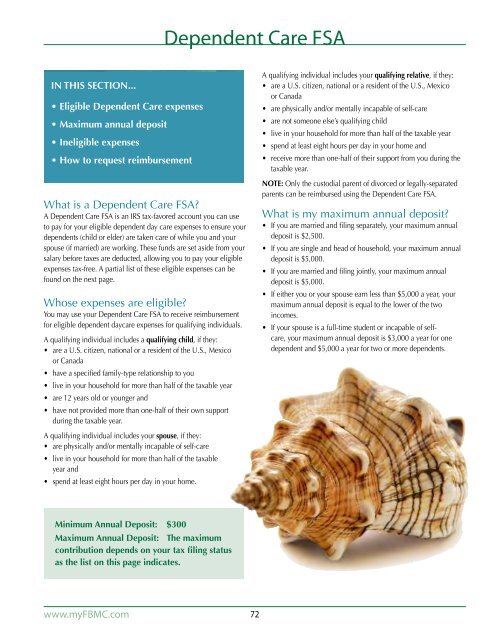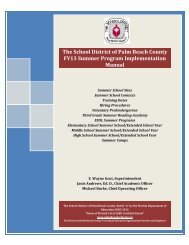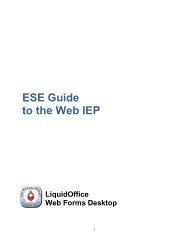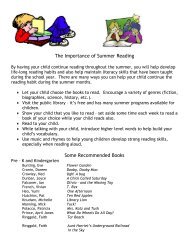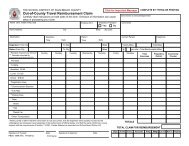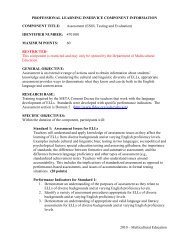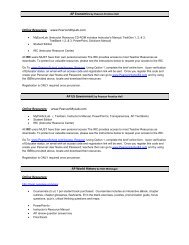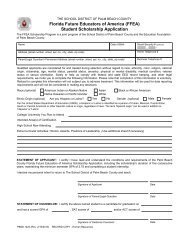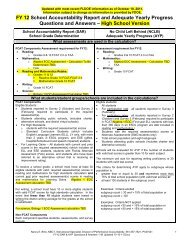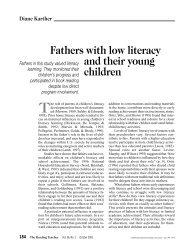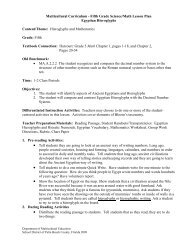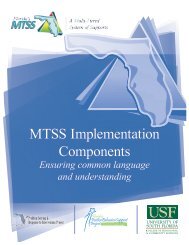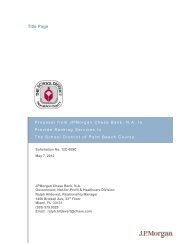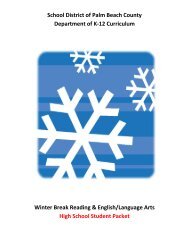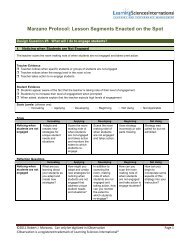Benefit Reference Guide - The School District of Palm Beach County
Benefit Reference Guide - The School District of Palm Beach County
Benefit Reference Guide - The School District of Palm Beach County
You also want an ePaper? Increase the reach of your titles
YUMPU automatically turns print PDFs into web optimized ePapers that Google loves.
Dependent Care FSA<br />
In this section...<br />
• Eligible Dependent Care expenses<br />
• Maximum annual deposit<br />
• Ineligible expenses<br />
• How to request reimbursement<br />
What is a Dependent Care FSA?<br />
A Dependent Care FSA is an IRS tax-favored account you can use<br />
to pay for your eligible dependent day care expenses to ensure your<br />
dependents (child or elder) are taken care <strong>of</strong> while you and your<br />
spouse (if married) are working. <strong>The</strong>se funds are set aside from your<br />
salary before taxes are deducted, allowing you to pay your eligible<br />
expenses tax-free. A partial list <strong>of</strong> these eligible expenses can be<br />
found on the next page.<br />
Whose expenses are eligible?<br />
You may use your Dependent Care FSA to receive reimbursement<br />
for eligible dependent daycare expenses for qualifying individuals.<br />
A qualifying individual includes a qualifying child, if they:<br />
• are a U.S. citizen, national or a resident <strong>of</strong> the U.S., Mexico<br />
or Canada<br />
• have a specified family-type relationship to you<br />
• live in your household for more than half <strong>of</strong> the taxable year<br />
• are 12 years old or younger and<br />
• have not provided more than one-half <strong>of</strong> their own support<br />
during the taxable year.<br />
A qualifying individual includes your spouse, if they:<br />
• are physically and/or mentally incapable <strong>of</strong> self-care<br />
• live in your household for more than half <strong>of</strong> the taxable<br />
year and<br />
• spend at least eight hours per day in your home.<br />
A qualifying individual includes your qualifying relative, if they:<br />
• are a U.S. citizen, national or a resident <strong>of</strong> the U.S., Mexico<br />
or Canada<br />
• are physically and/or mentally incapable <strong>of</strong> self-care<br />
• are not someone else’s qualifying child<br />
• live in your household for more than half <strong>of</strong> the taxable year<br />
• spend at least eight hours per day in your home and<br />
• receive more than one-half <strong>of</strong> their support from you during the<br />
taxable year.<br />
NOTE: Only the custodial parent <strong>of</strong> divorced or legally-separated<br />
parents can be reimbursed using the Dependent Care FSA.<br />
What is my maximum annual deposit?<br />
• If you are married and filing separately, your maximum annual<br />
deposit is $2,500.<br />
• If you are single and head <strong>of</strong> household, your maximum annual<br />
deposit is $5,000.<br />
• If you are married and filing jointly, your maximum annual<br />
deposit is $5,000.<br />
• If either you or your spouse earn less than $5,000 a year, your<br />
maximum annual deposit is equal to the lower <strong>of</strong> the two<br />
incomes.<br />
• If your spouse is a full-time student or incapable <strong>of</strong> selfcare,<br />
your maximum annual deposit is $3,000 a year for one<br />
dependent and $5,000 a year for two or more dependents.<br />
Minimum Annual Deposit: $300<br />
Maximum Annual Deposit: <strong>The</strong> maximum<br />
contribution depends on your tax filing status<br />
as the list on this page indicates.<br />
www.myFBMC.com<br />
72


